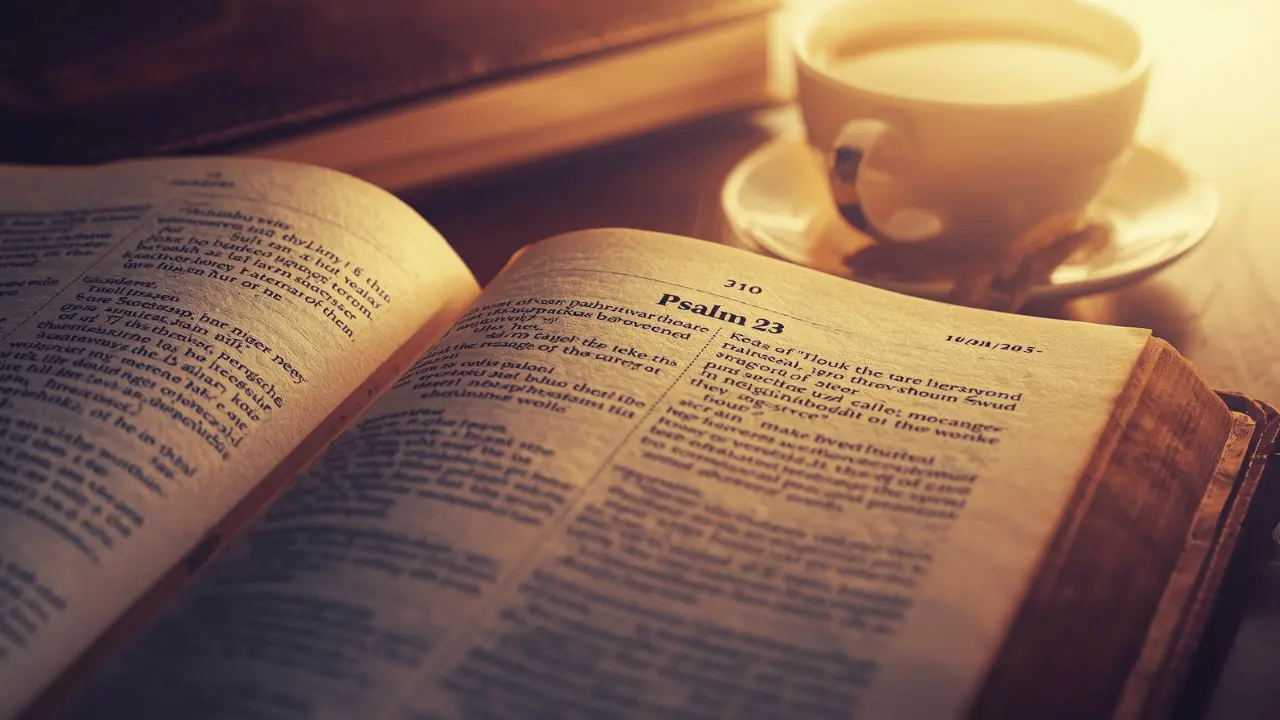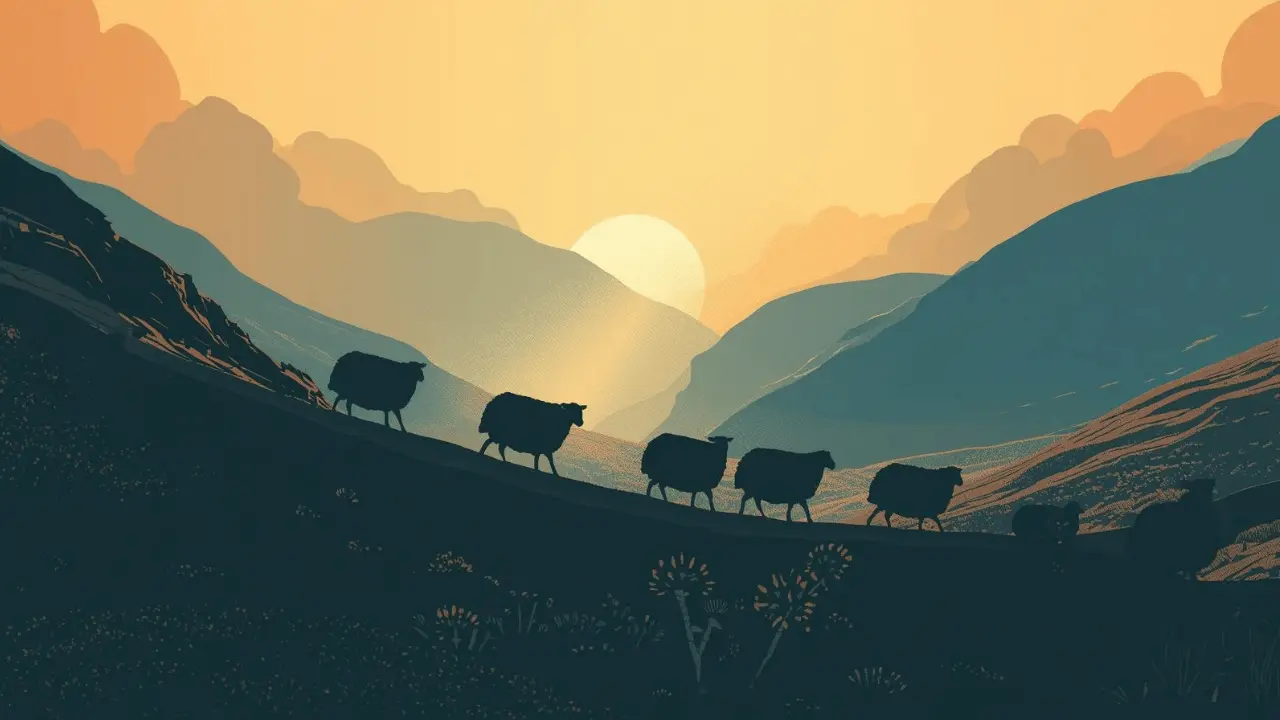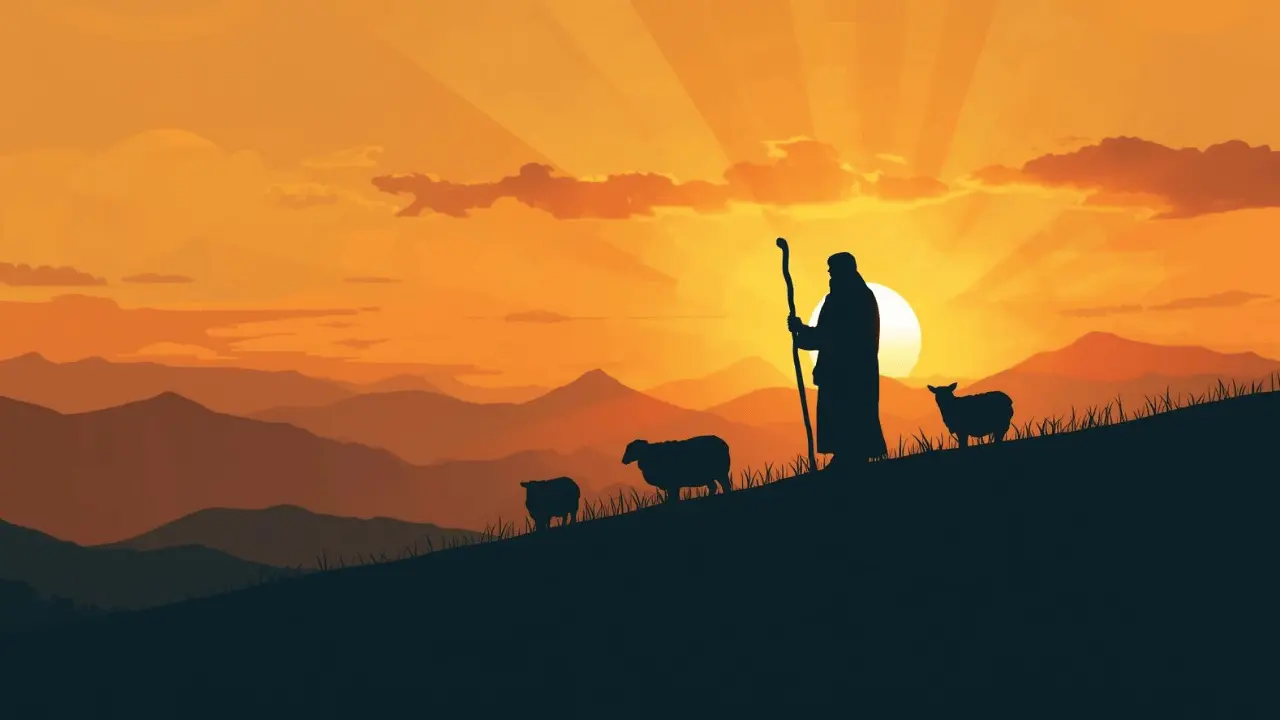“The Lord is my Shepherd; I shall not want.”
Few lines in Scripture bring more comfort than these. Psalm 23 is one of the most loved and quoted passages in the Bible — a prayer that has brought peace to countless hearts for thousands of years. Whether spoken in moments of grief, whispered in quiet prayer, or sung in worship, the Shepherd’s Psalm reaches deep into the soul.
Psalm 23 Prayer – The Shepherd’s Promise
Psalm 23 isn’t just a passage; it’s a promise. It reminds us that even in our hardest seasons — when life feels uncertain or heavy — we’re never walking alone. God, our Shepherd, lovingly leads us toward peace, renewal, and eternal security.
This psalm invites us to place our full trust in Him — not in our own strength, but in the One who already knows every valley, every shadow, and every need.
What Is Psalm 23? The Beloved Shepherd Psalm

The Full Text (King James and Catholic Versions)
King James Version (KJV):
The Lord is my shepherd; I shall not want.
He maketh me to lie down in green pastures: he leadeth me beside the still waters.
He restoreth my soul: he leadeth me in the paths of righteousness for his name’s sake.
Yea, though I walk through the valley of the shadow of death, I will fear no evil: for thou art with me; thy rod and thy staff they comfort me.
Thou preparest a table before me in the presence of mine enemies: thou anointest my head with oil; my cup runneth over.
Surely goodness and mercy shall follow me all the days of my life: and I will dwell in the house of the Lord forever.
Catholic Translation (New American Bible):
The Lord is my shepherd; there is nothing I lack.
In green pastures you let me graze; to safe waters you lead me.
You restore my strength; you guide me along the right path for the sake of your name.
Even when I walk through a dark valley, I fear no harm for you are at my side;
your rod and your staff give me courage.
You set a table before me in front of my enemies;
you anoint my head with oil; my cup overflows.
Only goodness and kindness will follow me all the days of my life,
and I shall dwell in the house of the Lord for years to come.
Though the wording differs slightly, both versions express the same everlasting truth — peace and security in God’s care.
Who Wrote Psalm 23 and Why
Psalm 23 is attributed to King David, who once tended sheep before he became Israel’s king. Many believe he wrote it later in life, reflecting on how God had faithfully guided and protected him through danger, loss, and triumph.
The shepherd imagery was deeply personal for David — he knew first-hand what it meant to care for and protect sheep. In this psalm, he beautifully paints God as the perfect Shepherd who watches over His people with love and strength.
The Timeless Message of Trust and Divine Guidance
At its heart, Psalm 23 is about relationship. It doesn’t present God as distant or unreachable, but as a personal guide and companion. It’s a song of peace for the hurting, hope for the weary, and reassurance for anyone who’s ever felt lost.
Psalm 23 Explained Verse by Verse

Let’s walk through each line together and unpack its meaning for our lives today.
“The Lord is my Shepherd; I shall not want.”
Right from the start, David declares total trust. “I shall not want” doesn’t mean we’ll get everything we desire — it means God provides all we truly need. In a world driven by striving and comparison, this verse invites us to rest in contentment, knowing our Shepherd never fails to care for us.
“He maketh me to lie down in green pastures.”
Sheep only lie down when they feel completely safe. Likewise, when we rest in God’s presence, our hearts can finally breathe. The green pastures symbolize peace, refreshment, and the deep rest that only His care provides.
“He restoreth my soul.” – Healing from Within
When life wears us down, God doesn’t just patch us up — He restores us. His presence revives our spirit, mends what’s broken, and reminds us that even when we feel empty, He can renew us from the inside out.
“Yea, though I walk through the valley of the shadow of death.”
This verse is often read during funerals because it speaks to life’s darkest moments. The “valley” isn’t just about physical death — it represents fear, loss, and hardship. Yet David says, “I will fear no evil,” because God walks with him. The promise isn’t that life will be free of pain, but that we’ll never face it alone.
“Thou preparest a table before me.”
Even when surrounded by enemies or challenges, God blesses us. The table represents provision, victory, and fellowship — a reminder that His love is stronger than any opposition we face.
“Surely goodness and mercy shall follow me.”
The psalm closes with confidence: God’s goodness and mercy don’t just accompany us — they pursue us. His care doesn’t end when life gets tough; it surrounds us, day after day, until we finally rest in His house forever.
How to Use Psalm 23 in Prayer and Reflection
Praying Psalm 23 Daily
Try praying Psalm 23 slowly, pausing after each line. Let every word sink in. Many people find it grounding to pray it in the morning for focus, or at night for peace.
Personalizing the Prayer
Make it your own. Insert your name or situation as you pray:
“The Lord is my Shepherd. He restores my soul. Even though I walk through this valley, He is with me.”
Speaking Scripture this way turns it from a reading into a conversation with God.
Finding Strength in Hard Times
When you’re anxious, grieving, or afraid, Psalm 23 can anchor your heart. Reading it aloud helps you remember: God hasn’t left you. He’s walking right beside you.
Psalm 23 in Funerals and Memorials
This psalm is often read at funerals because it points to eternal hope — the peace of knowing that God’s care doesn’t end with death. It comforts the living while honouring those who’ve gone home to Him.
Psalm 23 in Worship and Teaching
Hymns Inspired by the Psalm
Many beloved hymns and worship songs — like “The Lord’s My Shepherd” and “Surely Goodness and Mercy” — come straight from Psalm 23. Their melodies keep the Shepherd’s promise alive in every generation.
Teaching Psalm 23 to Children and Youth
For kids, the shepherd imagery is powerful. Use stories, songs, or art projects to help them picture God’s love and care. It’s a gentle way to plant seeds of trust and faith early on.
Using Psalm 23 in Sermons or Bible Studies
Teachers and preachers often return to Psalm 23 to talk about divine guidance and courage through trials. In Bible study, it sparks reflection on personal faith and surrender — how we can live as people fully led by the Shepherd.
Key Lessons from Psalm 23 for Modern Life
Trusting God’s Provision in a Busy World
In our self-driven culture, it’s easy to depend on our own strength. Psalm 23 reminds us to rest — to let God lead and provide instead of striving on our own.
Finding Gratitude and Resilience
When storms hit, “Thou art with me” becomes a lifeline. Gratitude grows when we see God’s hand in both our struggles and our blessings. His rod and staff gently guide us home.
Living Out the Shepherd’s Message
Living Psalm 23 means reflecting God’s care in our own lives — being kind, patient, and steady in faith. It challenges us to shepherd others with the same compassion He shows us.
Related Psalms and Biblical Connections
Psalm 23, Psalm 91, and Psalm 121
These three psalms form a trio of comfort and protection. Psalm 23 speaks of God’s guidance, Psalm 91 of His protection, and Psalm 121 of His watchful care over every step we take.
Other Comforting Psalms by David
Psalms 27, 34, and 62 carry the same heartbeat of faith — courage in adversity and peace in God’s presence. Together, they paint a picture of a life fully anchored in trust.
The Good Shepherd in the New Testament
In John 10, Jesus fulfills the image of Psalm 23:
“My sheep hear my voice; I know them, and they follow me.”
It’s the same message — God’s love never changes, and His care never ends.
FAQs About Psalm 23
Who wrote Psalm 23?
King David wrote it, likely later in his life, reflecting on God’s guidance from his shepherding days to his reign as king.
What’s the best version to pray?
Both the King James and Catholic versions are beautiful — choose whichever one speaks most personally to your heart.
Why is Psalm 23 read at funerals?
It offers deep comfort, reminding us of God’s presence, peace, and promise of eternal life.
What does “the valley of the shadow of death” mean?
It represents life’s hardest moments — times of fear, grief, or uncertainty — where faith reminds us we’re never alone.
How can I teach Psalm 23 to children?
Use visuals, music, or storytelling to help them picture God as a loving Shepherd who protects and guides them.

